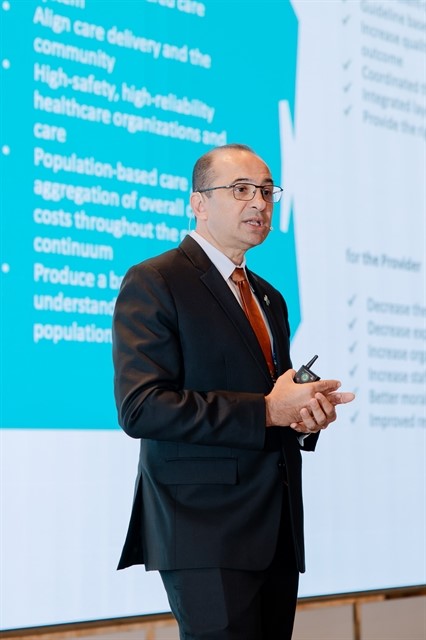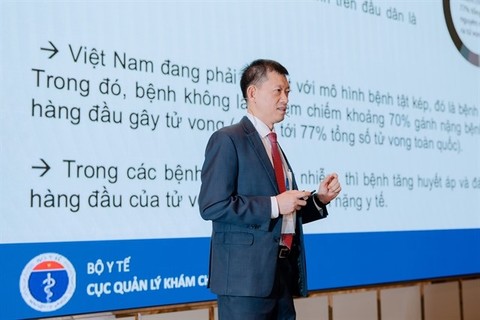
Dr. Dilshaad Ali Bin Abas Ali, Group CEO of Hoàn Mỹ Medical Group delivering his speech at the event. — Photo courtesy of Hoàn Mỹ
The healthcare sector needs to shift from a hospital-centric model to a patient-centric one to meet the needs of patients, especially in light of an aging and growing population, said Dr. Dilshaad Ali Bin Abas Ali, Group CEO of Hoàn Mỹ Medical Group.
During a roundtable on healthcare transformation in HCM City this week, he said that with this new model of care, the healthcare sector would focus not only on patients' experiences in hospitals, but also on establishing a system capable of providing healthcare services directly at home through digital applications.
"Successfully implementing this model can help reduce costs for patients," he said.
"For the patient-centric model, system design plays a crucial role, as it determines the success or failure of efforts to enhance patient experience.
"The operation of the home and hospital care model requires intelligent digital integration, involving logistics, and understanding and effectively utilising data. Moreover, service quality must be measured and resulting actions clearly defined," he said.
Attendants at the event agreed that Việt Nam's health sector is facing an increasingly high need for treatment and care due to population growth, aging demographics and improved living standards.
Dương Huy Lương, Deputy Director of the Department of Medical Service Administration, under the Ministry of Health, said Việt Nam has encountered challenges from the dual disease burden (infectious and non-communicable diseases), increasing the risk of mortality and imposing a burden on society.
“This underscores the need to swiftly transform and continuously enhance the quality and efficiency of the healthcare system from central to local levels to adapt to changing disease patterns,” he said.
According to Lương, Vietnamese people spend around US$2 billion every year on medical treatment abroad, a figure that could rise to $3-4 billion in the coming years.

Dương Huy Lương, Deputy Director of the Department of Medical Service Administration under the Ministry of Health speaking at the event. — Photo courtesy of Hoàn Mỹ
He added that if Việt Nam is to become a regional healthcare hub, there needs to be comprehensive solutions on such things as training high-quality healthcare professionals, investing in robust infrastructure, developing specialised medical services, advancing digital transformations and simplifying administrative procedures.
Increasing access to quality healthcare services
Participants at the event also discussed the accessibility of healthcare services with an equitable delivery model.
Alongside the rapid growth of the middle class, with a higher disposable income for healthcare, a large segment of Vietnamese people still seek better-quality private healthcare services at affordable costs.
The healthcare sector's transformation needs to meet the demands of both high-income individuals, potentially redirecting the $2 billion spent abroad every year for medical treatment back to Việt Nam and the general public, particularly those on below-average incomes.
"The Hoàn Mỹ ecosystem is focusing on building and developing healthcare facilities that cater to people’s diverse needs and financial capabilities,” the group's CEO Dilshaad Ali Bin Abas Ali said.
“Hoàn Mỹ is expanding access to healthcare through the Thuận Mỹ network of hospitals and clinics, offering quality medical services at affordable costs.
"Our vision is that, by 2030, we will have transitioned from leading the medical sector to shaping healthcare culture, to advance the health and well-being of all Vietnamese people.”
In her speech at the event, Louise Cuskelly, Executive Director at the ACHS International & Consulting, shared insights on high-quality care elements, challenges and practical experiences to help Vietnamese healthcare facilities raise care standards to international levels.
Additionally, with digitalisation, processes that optimise data flow between medical devices and computer models are essential, she said.
Meanwhile, James Anibal, a Researcher at Oxford University said despite challenges, digital healthcare models have demonstrated potential advantages in optimising costs, time and patient accessibility.
He added that in the future, artificial intelligence (AI) applications may help doctors worldwide reduce errors in diagnosis and treatment processes, ultimately improving the quality of care.
Việt Nam’s healthcare sector aims to position the country as a destination for health and wellness tourism within the next 20 years, contributing to the country’s economic growth, while building a 'healthcare industry' for the future. — VNS